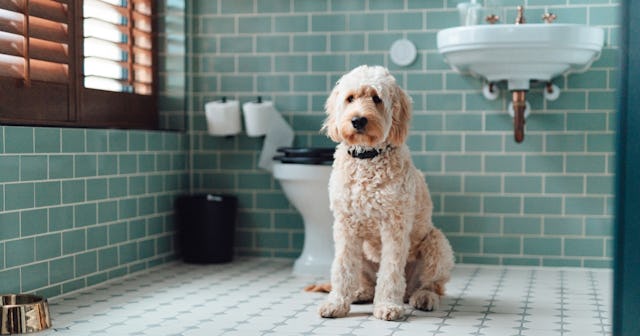How To Stop Diarrhea In Dogs So Fido Feels Better Sooner

When it comes to your dog, sometimes referring to the “runs” doesn’t mean grabbing a leash and your sneakers but instead grabbing a bucket and mop to clean up some doggie diarrhea. Just like humans, dogs can pick up various viruses and bacteria or eat something that just doesn’t agree with their digestive system. While diarrhea is a fairly common issue for dogs, it doesn’t make it less gross or unpleasant when it comes to cleaning up the aftermath of a poopy mess. Knowing how to stop diarrhea in dogs and what causes it might help reduce the number of times you need to reach for the carpet cleaner.
Granted, sometimes dealing with your dog’s diarrhea might mean a quick road trip to the vet. Hey, better to be safe than sorry, right? But sometimes it’s as simple as using some home remedies to help, er, lighten the load. Keep reading for the full scoop (OK, we’re done now).
What Causes Diarrhea in Dogs
There are several reasons why your dog might have tummy problems. Here are some of the most common causes:
- Food intolerance or allergy
- Changes in diet
- Eating something they weren’t supposed to
- Leaky gut or poor gut health
- Parasites
*A few diarrhea-causing parasites to remember include roundworms, hookworms, whipworms, Coccidia, or Giardia.*
- Bacteria or viral infections
- Stress and anxiety
- Over exercise
- Heat exhaustion/exposure
- Poisonous substances or plants
- Antibiotics or other medications
- Spoiled food
- Inflammatory bowel disease
- Pancreatitis
- Intestinal cancer
*A few other conditions to look out for that may accompany your dog’s diarrhea, include fatigue or weakness, vomiting, unusual drooling, loss of appetite, sunken eyes, dry nose, and dry gums.*
Does your dog give you puppy eyes every time you have a snack? Although sharing food with your dog may be a regular occurrence in your household, it is important to know which foods can give them diarrhea. So to keep your pup’s bowels healthy, avoid feeding them:
- Grapes
- Raisins
- Onions
- Macadamia nuts
- Chocolate
- Alcohol
- Coffee
- Avocados
- Tomatoes, especially the stems, and leaves
- Foods with the xylitol, which some peanut butter contains
Note: If Fido’s diarrhea is accompanied by fatigue, excessive drooling, vomiting, and/or blood in the stool, then you need to take your dog to the veterinarian immediately. But as long as your family dog is otherwise healthy, acting normally, and isn’t a senior or puppy, you can probably treat their diarrhea at home.
However, bouts of diarrhea that last longer than 48 hours mean your dog is at risk for dehydration. To test if your dog is dehydrated, pinch the skin at the back of her neck, then let go. It should bounce right back again. If the pinch of skin takes a second or more to return to normal, your dog might be dehydrated. If your dog is showing any signs of dehydration or is not getting any better, you should take them to the vet for medical attention.
Home Remedies for Dog Diarrhea
Fortunately, knowing how to stop diarrhea in dogs doesn’t always mean a trip to the store or a visit with the vet. Many cases are mild enough to be treated with the following home remedies.
Make sure they are drinking lots of water.
Like humans, dogs lose a lot of water and electrolytes after a case of diarrhea and can become dehydrated. Ensure they are drinking lots of water by keeping multiple bowls of water accessible to them. You might even want to add beef or chicken broth to the water to entice them further.
Put them on a fast.
This method is best for healthy and young dogs who can endure a fast. For example, puppies and senior dogs are not encouraged to fast as they need as many nutrients as they can muster, even with diarrhea. However, for other dogs, withholding food for 12 to 24 hours while providing water can help pass along whatever is causing the upset much faster through their gastrointestinal tract.
*However, keep in mind this method can be especially harmful to puppies and older dogs. Dogs get a lot of their nutrition from their food, and sometimes fasting can cause them to lose out on nourishment. It can also cause damage to your pup’s intestine wall. So it’s important to check in with your dog’s veterinarian before putting them on a fast.
Give them some pure pumpkin.
Canned pumpkin (meaning plain and not pie filling) is an excellent source of fiber and can help normalize stool consistency.
Serve them a bland diet.
You know how crackers, bananas, and rice help settle your stomach? The same goes for your pooch. For the next 12 to 24 hours, skip your dog’s normal food and instead serve them some bland boiled chicken and cooked rice in small meals throughout the day. You might have to keep up this diet for a few extra days to make sure their tummy is totally settled.
Provide some good gut bacteria.
Just as is true with humans, your dog’s gut health gets stripped of its healthy and good bacteria after a bout of some loose stools. Serve your dog some plain (not sugary or flavored) yogurt to help get their tummy back on track. In addition, giving them some canine-friendly probiotics is also a great alternative to help them feel like their old selves again.
Hopefully, these easy home remedies will have your pup feeling like their typical happy, healthy, solid-pooping self again soon. But again, don’t hesitate to reach out to their vet if their condition worsens or doesn’t seem to improve over time.
This article was originally published on